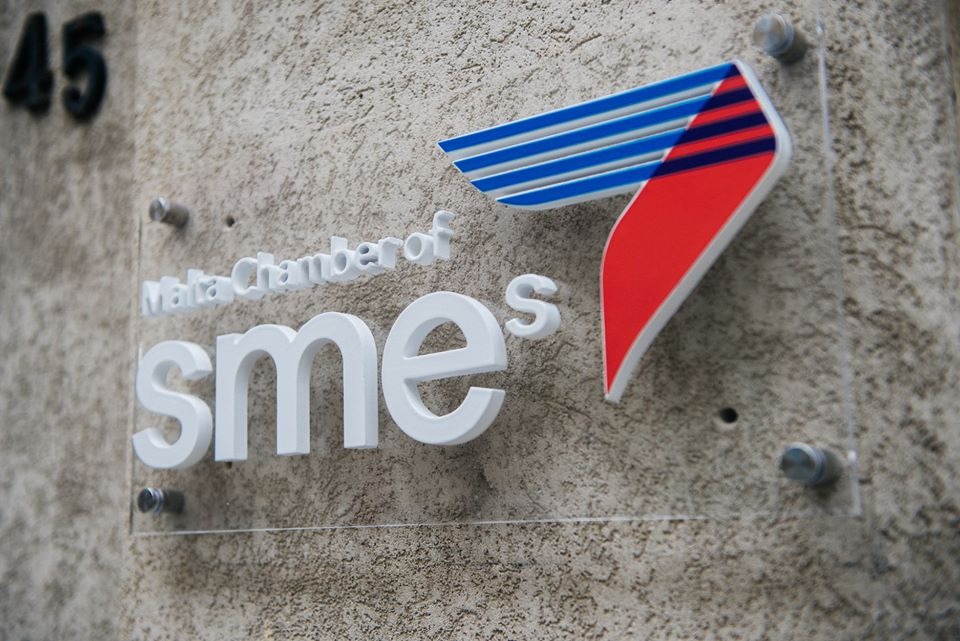Local businesses report mixed responses to the COVID-19 pandemic and the restricted reopening of the last weeks, with mental health concerns among employees noted as a particularly pressing concern.
The Malta Chamber of SMEs on Friday released the results of a survey it conducted with its members on the continued effects of the COVID-19 pandemic.
The survey was conducted between 10-18th of May among 250 businesses operating in Malta, 49 per cent of which were micro businesses employing between one and nine employees while another 16 per cent were self-employed individuals.
Of the businesses surveyed, 42 per cent had been ordered to close as a result of the pandemic, while 11 per cent were confused and unsure whether they had to close, a situation that may have created some unfair competition as their peers kept on operating while they were closed.
Asked how 2021 compared to 2020, also a pandemic year, 47 per cent indicated that it was worse, with many saying that 2020 had left them in a weak position. Another 24 per cent felt it that business was the same as in the previous year.
When rating how the days of business since reopening, those saying it had been very slow outstripped those who deemed it satisfactory by 39 to 34 per cent.
The results showed that the tax deferral scheme offered by Government might not have been as attractive as nticipated, with only 30 per cent actually making use of it, while another 11 per cent did not know about it. The majority, 59 per cent, knew about it but did not make use of it.
Of those who did ask for a tax deferral, over half, 52 per cent, have started payments, while another 22 per cent said they would start paying their due tax later on this year. However, 17 per cent said they are unsure when they would be in a position to start payments, while another 9 per cent indicated that it would certainly be no sooner than next year.
Only 16 per cent made use of bank moratoria, of which 62 per cent had continued their loan repayments.
Although over half of those who applied for a moratorium found the process smooth, 17 per cent said it involved a lot of red tape, 13 per cent said that it was “very very difficult”, and another 14 per cent said that although they were given the impression they could apply for a moratorium, this was not actually the case.
Turning to their biggest concerns, in terms of financial constraints, businesses pointed to a number of factors, with sales levels (19 per cent), cash flow (15 per cent), and general uncertainty (14 per cent) weighing most heavily on business owners’ minds.
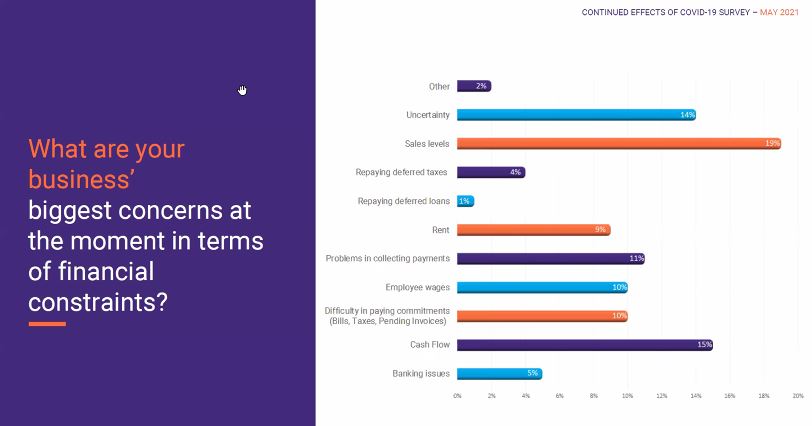
These were followed by problems in collecting payments (11 per cent), wages and other commitments like bills, taxes and pending invoices (both at 10 per cent), and rent (9 per cent).
Asked how long they believe their business would be able to survive in the current situation, 41 per cent said it would not survive more than six months, although a similar percentage, 38 per cent, said that it could survive for longer than 12 months.
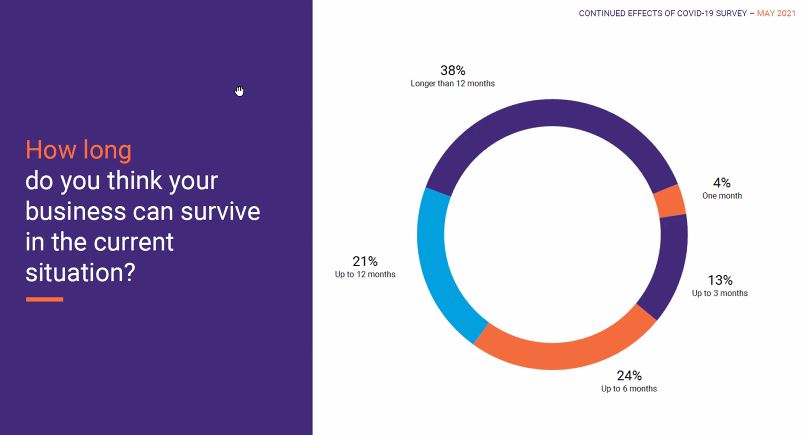
An encouraging 19 per cent of businesses meanwhile said that they had already started recovering, with almost half staggering their expected recovery date over the rest of 2021. However, 23 per cent expressed uncertainty in this regard.
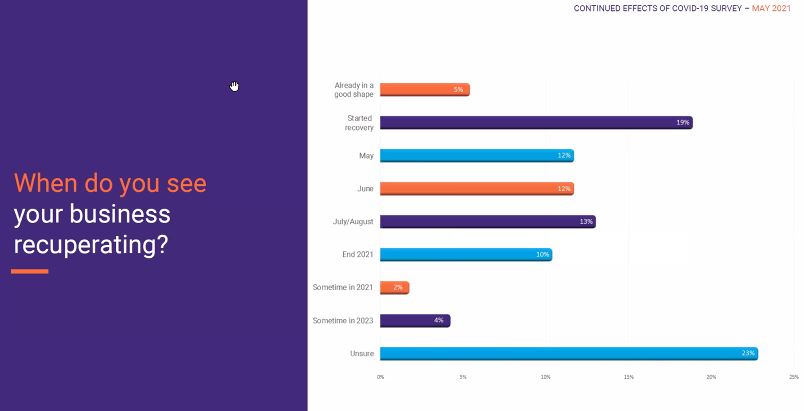
A full third of respondents were “very dissatisfied” with their turnover during the first four months of 2021, while another 25 per cent were dissatisfied. Few businesses were very satisfied (4 per cent) or satisfied (9 per cent).
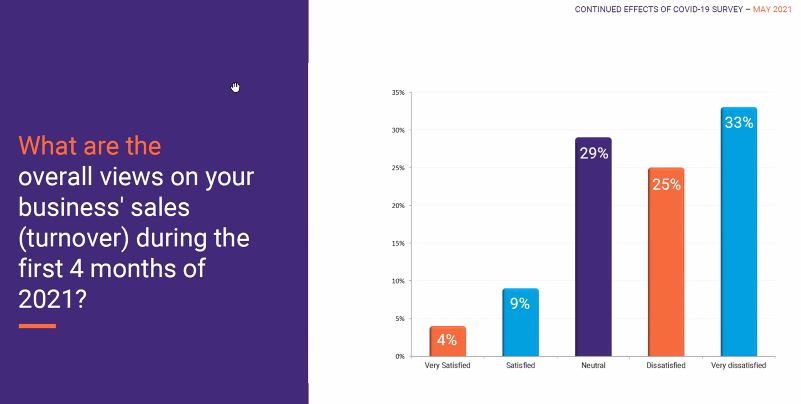
Asked how these sales related to their expectations at the beginning of the year, a roughly equal amount said they were as expected (47 per cent) or worse than expected (48 per cent), with only 5 per cent reporting better than expected performance.

Over a third of respondents (37 per cent) said they would not be changing their business plans further after 2020, while 14 per cent indicated they would start develop their ecommerce potential, 10 per cent said they would downsize, 9 per cent said they would expand their operations in Malta, and 7 per cent said they would be reducing employees.

Further analysing the situation with ecommerce, 33 per cent they were selling goods or services online, while 40 per cent said they were not. Another 27 per cent indicated that online selling does not apply to them.
Of those who were selling online, 46 per cent were satisfied with the results but 54 per cent said they were not satisfied with the response to their online platform.
Responses to a question on how the Government can better support businesses’ ecommerce efforts were mixed, with 13 per cent saying they need assistance to set up a better platform, 11 per cent saying they need marketing support, and eight per cent saying they do not have enough human resources, while 13 per cent were unsure of what is needed.
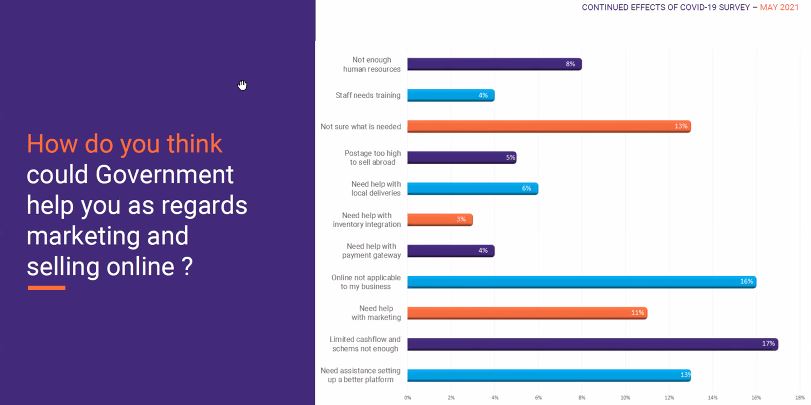
In perhaps the most shocking result to emerge out of the survey, a full 60 per cent of business owners indicated that mental health issues and feelings of detachment had increased when compared to pre-COVID times, with 14 per cent saying that such issues increased substantially.

Government introduces mandatory physical inspection for vintage vehicle classification
From 1st September 2025, vehicles seeking vintage status must undergo a physical inspection by the official classification committee
Local filmmakers paid just €250 to screen at Mediterrane Film
The figure stands in stark contrast to the estimated €5 million total spend
Malta International Airport closes in on one million passengers in June
Meanwhile, aircraft traffic movement rose by 4.5 per cent year on year


